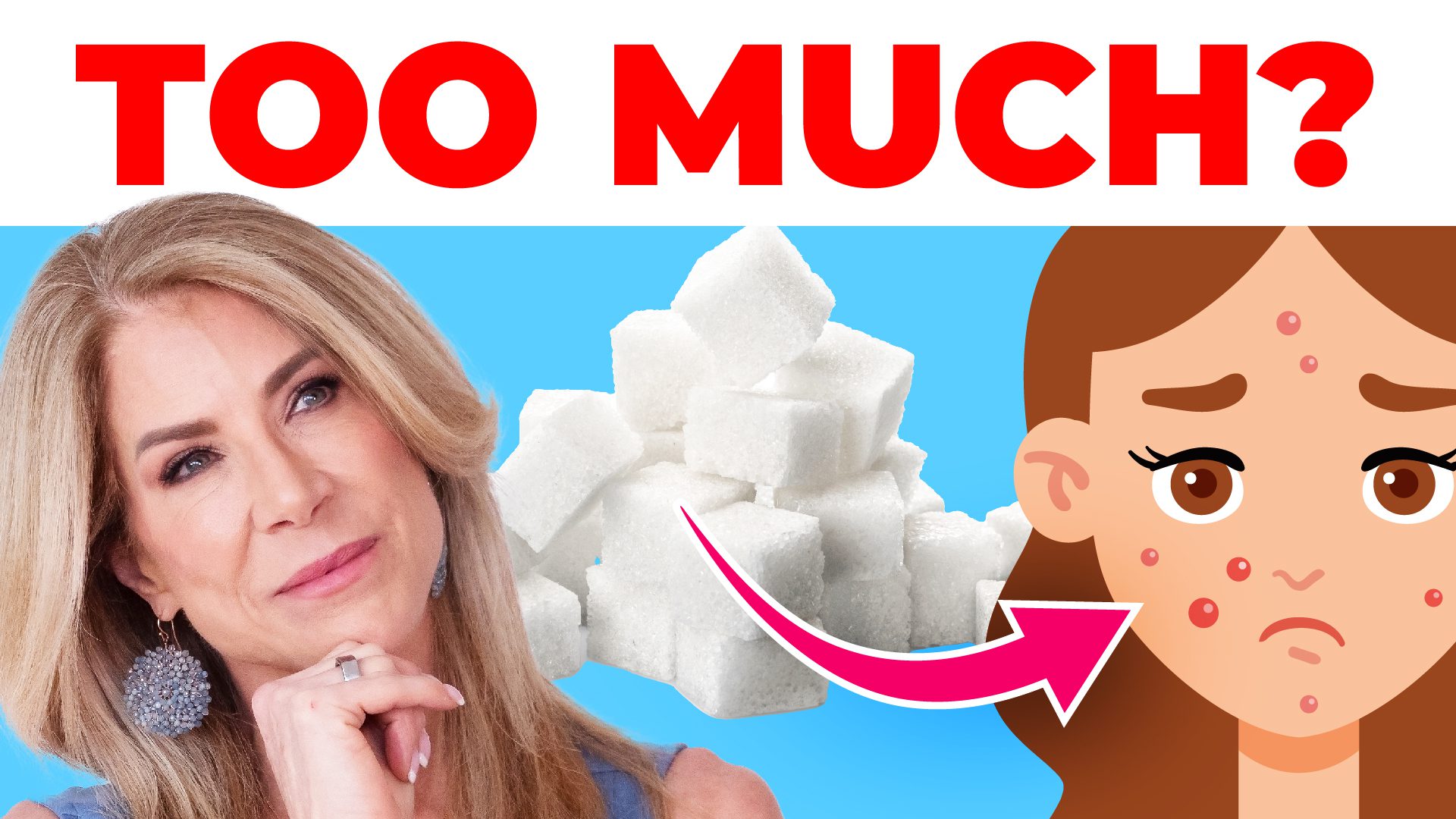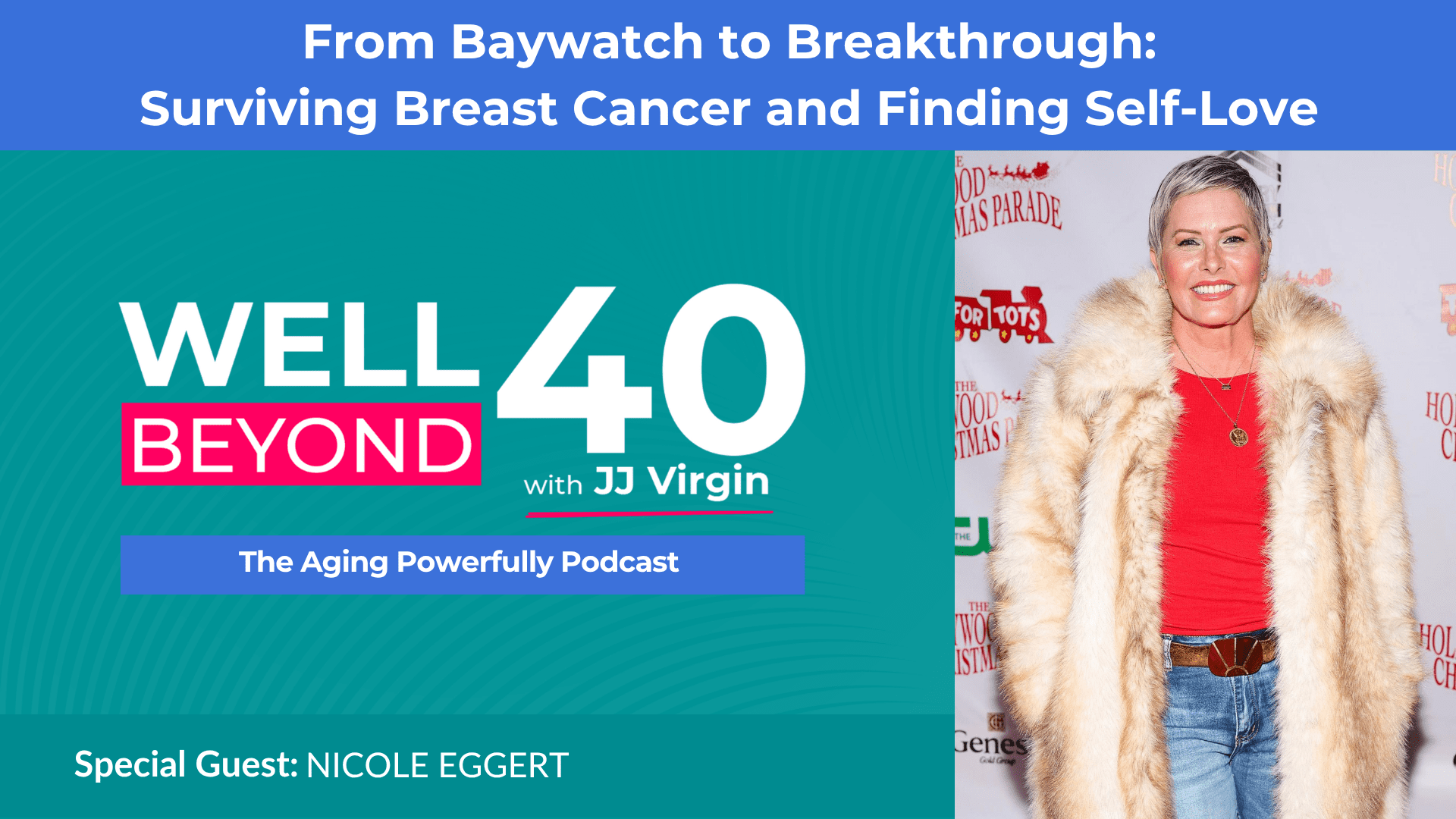Why Your Cravings and Energy Crashes Won’t Go Away
In this episode, we dive deep into a sneaky culprit that could be sabotaging all your hard work: sugar overload. Even if you’re steering clear of obvious sweets, hidden sugars might be sneaking into your diet from unsuspecting sources, leaving you feeling drained, struggling with cravings, and frustrated with stubborn weight that just won’t budge. Could sugar be the reason behind your energy roller coaster and those nagging mood swings? We’re uncovering how this sweet stuff can wreak havoc on your body’s energy balance, and what you can do about it.
You’ll learn about the science behind sugar addiction and its surprising effects on brain chemistry, cravings, and your body’s ability to burn fat. We’re breaking down how excess sugar leads to insulin resistance, making weight loss feel impossible despite your best efforts. Plus, we’ll explore the troubling link between sugar and mood disorders, acne, aging skin, and even your immune system’s ability to fight off colds and infections.
Join me as I share a personal story that really hits home, involving my son and a pound of M&Ms—trust me, it’s a lesson every parent needs to hear! Whether you’re dealing with persistent cravings, energy crashes, or just can’t seem to lose that stubborn belly fat, this episode is packed with insights that could change the way you think about sugar. Don’t miss out—tune in to find out how to kick the sugar habit for good and start seeing the results you deserve.
Timestamps
00:01:02- The Hidden Culprit: Sugar Overload
00:01:31- Unstable Energy Levels and Sugar
00:02:39- Persistent Cravings and Sugar Addiction
00:04:06- Difficulty Losing Weight Due to Sugar
00:06:40- Mood Fluctuations Linked to Sugar
00:08:23- Sugar’s Impact on Skin Health
00:10:14- Belly Fat and Sugar Consumption
00:11:33- Frequent Illnesses and Sugar’s Effect on Immunity
Resources Mentioned in this episode
Download my FREE Best Rest Sleep Cheat Sheet
Study: Effects of free access to sugar solutions on the control of energy intake
Study: Today’s obesity epidemic may have been caused by childhood sugar intake decades ago
Study: Doctors warn that sugar can temporarily weaken your immune system
Episode Sponsors:
Try Timeline. Use code JJ10 for 10% off all products
Try Qualia risk-free for up to 100 days and code VIRGINWELLNESS for an additional 15% off
I’m JJ Virgin, PhD dropout, sorry mom, turned four time New York Times bestselling author. Yes, I’m a certified nutrition specialist, fitness hall of famer, and I speak at health conferences and trainings around the globe, but I’m driven by my insatiable curiosity and love of science to keep asking questions, digging for answers, and sharing the information I uncover with as many people as I can.
And that’s why I created the Well Beyond 40 Podcast. To synthesize and simplify the science of health into actionable strategies to help you thrive. In each episode, we’ll talk about what’s working in the world of wellness, from personalized nutrition and healing your metabolism, to healthy aging and prescriptive fitness.
Join me on the journey to better health so you can love how you look and feel right now and have the energy to play full out at 100.
You’re dieting and exercising like crazy, but you still can’t seem to lose the weight or have the energy you want. That exhaustion and lack of results could be from one sneaky culprit, sugar overload. Now, I’m Even if you’re avoiding obvious sweets, you might be unknowingly OD’ing on the sweet stuff from unsuspecting sources.
If you struggle with any of these issues despite your hard work, it’s time to find out how added sugars are blocking your results. So the first one is unstable energy levels. Now if you find yourself riding the energy roller coaster, feeling sky high one minute and Boom! Crashing the next. It’s a classic sign of too much sugar in your diet.
This instability often leads to reaching for more sugary quick fixes to regain that energy spike. Now there’s two ways that you can get this energy crash and one is obvious. You feel tired and shaky when your blood sugar drops from high to low, but the other one isn’t. So, there was a 2017 literature review that was published in Food Reviews International found that having unlimited access to sugary drinks can throw up your body’s balance of energy, leading to obesity and related health issues.
Not a big surprise. Here’s what it is. The research shows that consuming too much sugar disrupts how the body controls its energy intake. It affects the body’s peripheral, like their fat levels and hormones, and central, your brain’s control center, mechanisms, which leads to an imbalance that can lead to weight gain and metabolic problems.
The next sign are persistent cravings. When sugar becomes a main fuel source, your body starts to demand it more and more. If you’re constantly craving sweets or carbs, consider it a red flag that your sugar intake might be excessive. And what I like to say here is that exposure equals preference. The more sweet you eat, the more sweet you want.
We’re actually hardwired to seek it out. There was a 2008 review published in Neuroscience and Biobehavioral Reviews that explains the idea of sugar addiction and its effects on behavior and brain chemistry. The main takeaway from this research is that in certain situations, rats can develop a dependence on sugar.
Which could have implications for human conditions such as eating disorders and obesity. The study examined whether sugar can be addictive, similar to drugs, due to its ability to activate brain pathways associated with rewards. Researchers found that sugar can lead to binging, withdrawal, and cravings.
Behaviors linked to changes in brain chemistry. They found that rats with intermittent access to food and a sugar solution can show both a constellation of behaviors and parallel brain changes that are characteristic of rats that voluntarily self administer addictive drugs. So I know there’s all this discussion out here that sugar is not addictive, but that’s not what I’ve seen in 40 years of working with clients.
Now the next thing is difficulty losing weight. If you are struggling to shed pounds despite all of your best efforts, excess sugar could be the culprit. It not only increases your calorie intake, but it also affects your metabolic pathways, which make weight loss so much harder. And this could be due to a couple of different reasons.
Number one is insulin resistance. We know that when you’re eating more sugar, your pancreas has to pump out more insulin. And over time, your receptors just don’t hear it as much. Insulin stays high, creates inflammation. And when insulin is high, it basically locks the doors to the fat cells. It’s very hard for you to burn off stored fat for fuel, which then can lead to increased hunger.
and increased cravings. Remember when you eat sweet, you crave sweet, and if your body’s used to fueling on sugar, you’re going to want more. But if you’re insulin resistant, you’ll also be hungry. And then, of course, we know that you’ll have a lower thermic effect of food. That protein has the highest thermic effect by a lot.
And carbohydrates have only about five to 10 percent thermic effect compared to proteins, 20 to 30%. Then you put it into ultra processed foods and it even could have a lower thermic effect. There was a 2019 epidemiological analysis that was published in economics and human biology. That investigated the relationship between excess sugar consumption and adult obesity in the United States.
Their key takeaway was that the significant increase in adult obesity after 1990 can be attributed to the delayed effects of added sugar calories consumed by children in the 1970s and 1980s. Now, overall, this study provides insights into the long term effects of sugar consumption. of excess sugar consumption on obesity rates.
And here is the reality on this. And when I was writing the sugar impact diet, I did, I dove into the history of sugar and sugar consumption. And what I found out was in the 1900s, and this is kind of mind blowing, the average person in the United States ate five pounds of sugar per year. The obesity rate back then in the population was one half percent.
Point five percent of the population was obese. Okay, in the 2000s, we eat over 150 pounds of sugar per person per year. The obesity rate now is over 40 percent. So, Correlation, causation, what do you think? Now the next one are mood fluctuations. If you are experiencing frequent mood swings, know that sugar impacts your mood by causing quick spikes and drops in blood sugar levels, which can lead to irritation, right?
Or depression. There was a 2017 observational study that was published in the Journal of Epidemiology and Community Health. That looked at this relationship between sugar intake from sweet foods and beverages and mental health outcomes. And what they found was that sugar consumption from these sources is associated with an increased likelihood of developing common mental disorders and reoccurring depression in women over 22 years.
They also found that men with the highest sugar intake had a 24 percent increase of developing this depression after 5 years, while women showed a 30 percent increased odds of reoccurring depression with every 30 gram increment in sugar intake. I mean, that is a concerning link between sugar impact and long term psychological health, which indicates that excessive sugar consumption from sweet foods and beverages may contribute to mood disorders.
Now, I will share a personal story that I will never, ever forget. When my kid was in kindergarten and I got the call from school, Where they said, your son is climbing the walls. You need to come pick him up. And I go, what the heck happened? And they go, well, he won the Christmas wrapping paper sale contest.
And so we gave him a pound bag of M& M’s. Now what happens when you give a five year old a pound bag of M& M’s? Kid eats it and climbs the walls. I felt like saying to them, you keep them, you did that. Now, when I was a teenager, I struggled a lot with acne. So, one of the first things I did, which is actually kind of a benefit in disguise, was I quit sugar.
And if you’re noticing more acne or skin flare ups, sugar might be to blame because it promotes inflammation. And what does that mean? That can show up in your skin, And disrupt your skin’s natural balance. There was a 2020 observational study that was published in the JAMA Dermatology Journal that looked at the association between dietary behaviors and adult acne.
And the main takeaway from this study is that the consumption of milk, which was one of the biggies for me, I’ll tell you, sugary beverages, And fatty and sugary products is associated with current acne in adults. In fact, this study had 24, 452 participants and 46 percent of them reported past or current acne.
And again, the researchers found significant associations between current acne and fatty and sugary products, beverages, and milk, which suggests that dietary factors, particularly those high in sugar and fat, May contribute to the development of acne in adults. Here’s the bottom line. It’s not just acne, it’s aging skin too.
Because sugar creates something called ages, advanced glycation end products. That is like the crust on bread and that leads to wrinkles and sagging. aging skin. Plus, we know that sugar drives inflammation. That excessive sugar intake can lead to the production of pro inflammatory cytokines. These are the molecules that signal the immune system to act.
Initiate an inflammatory response. And one of the things we also know about inflammation is inflammation can create its own, you know, risk factor for obesity. And speaking of obesity, sugar intake can cause increased belly fat. And when I talk about belly fat, I am talking about visceral adipose tissue.
This is that deep abdominal fat that’s associated with a lot of different health risks. So if you’re finding that you’ve got more fat around your midsection, it’s time to reassess your sugar intake. It is why I want you doing a waist to hip and waist to height ratio and taking that every single week and tracking the trends here.
Because again, it’s not what you weigh. It’s what that weight’s made up of. There was an observational study in 2014 that was published in the Journal of Nutrition that looked at sugary beverages and diet soda and how they affected this belly fat, this visceral adipose tissue. And what they found was that people who consume Sugary beverages tended to have more belly fat, particularly that visceral adipose tissue.
At the same time, those who drank diet soda didn’t show that same increase in belly fat. And this was over 2, 500 middle aged adults. It also was suggested in the study that if you cut back on sugary drinks, It might help reduce belly fat. I don’t know that you need to suggest that. Just cut back on your sugary drinks because not only is it going to get rid of that visceral adipose tissue, that can also reduce your risk of diabetes and heart disease because that’s one of the things that visceral adipose tissue does is can drive those.
The other thing you might notice if you’re doing a lot of sugar is that you get sick a lot. You have frequent colds and flus because too much sugar can suppress your immune system, which then makes you more susceptible to everything going around, the colds and the other infections. So if you’re getting sick more often, that sugar habit may be weakening your immune defenses.
There was a study, a 2022 epidemiological analysis that was published in Frontiers in Immunology that highlighted how high sugar consumption can weaken your immune system. The study showed that high dietary sugars, particularly from beverages and processed foods, disrupted the immune system’s ability to fight infections.
Specifically, consuming around 75 grams of sugar can impair white blood cells ability to combat bacteria and viruses for up to five years. Hours. That means that even if you follow a healthy lifestyle with good sleep and regular exercise and supplements, too much sugar consumption can compromise your immune system.
Here’s the other thing. Sugar competes with vitamin C to get into the cells. And this competition occurs because glucose, a form of sugar, and the oxidized form of vitamin C, share similar transport mechanisms. And so high levels of glucose can Inhibit the uptake of vitamin C and decrease those intracellular vitamin C levels.
All right. Now you know all the nasty signs of excess sugar, it’s time to break free for good.
Be sure to join me next time for more tools, tips, and techniques you can incorporate into everyday life to ensure you look and feel great and are built to last. Check me out on Instagram, Facebook, and my website, jjvirgin. com. And make sure to follow my podcast at subscribetojj. com so you don’t miss a single episode.
And Hey, if you’re loving what you hear, don’t forget to leave a review. Your reviews make a big difference in helping me reach more incredible women, just like you, to spread the word about aging powerfully after 40. Thanks for tuning in. And I’ll catch you on the next episode.
Hey, JJ here. And just a reminder that the Well Beyond 40 podcast offers health, wellness, fitness, and nutritional information that’s designed for educational and entertainment purposes only. You should not rely on this information as a substitute for, nor does it replace professional medical advice, diagnosis, or treatment.
If you have any concerns or questions about your health, you should always consult with a physician or other healthcare professional. Make sure that you do not disregard, avoid, or delay obtaining medical or health related advice from your healthcare professional because of something you may have heard on this show or read in our show notes.
The use of any information provided on this show is solely at your own risk.
Hide Transcript

 Subscribe to our show
Subscribe to our show 





